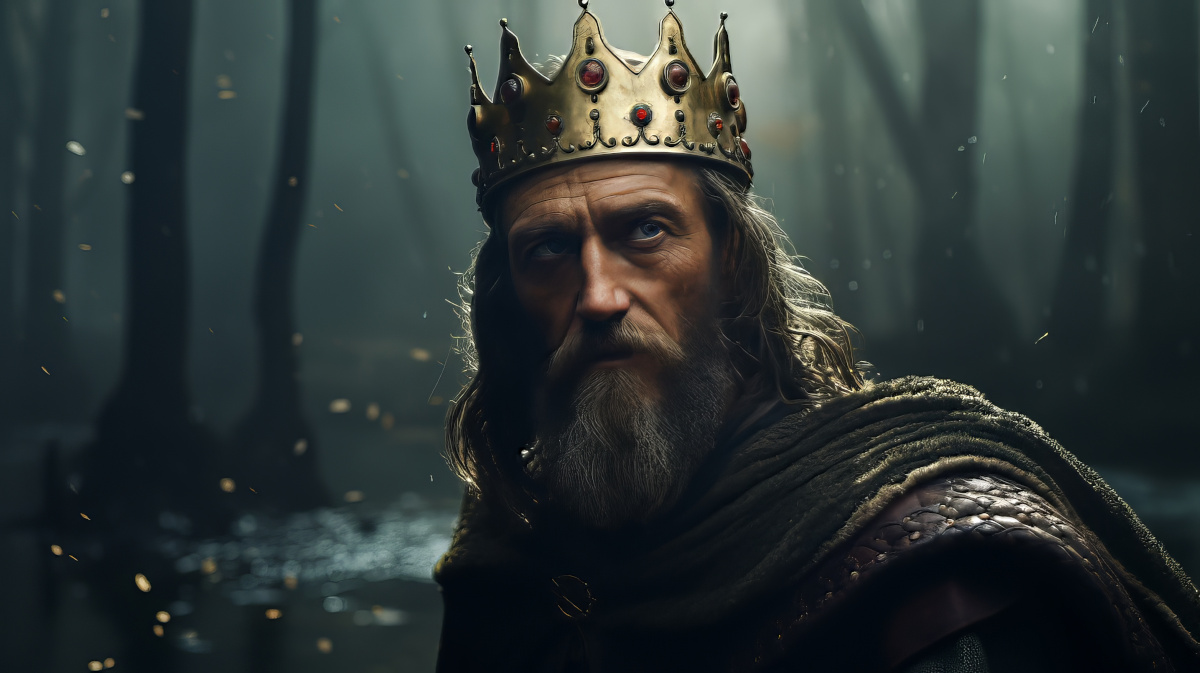
Cunobeline: The Historical King Who Inspired Shakespeare's Cymbeline
To write his plays, William Shakespeare looked for inspiration in a wide variety of sources, including myths, history, and popular stories of his day. Among Shakespeare’s inspirations were two ancient British kings. Of the two kings, King Lear is completely mythical. His biography is partially based on Leir of Britain, a legendary British monarch whose story Geoffrey of Monmouth recorded in his pseudohistorical 12th-century Historia Regum Britanniae (“History of the Kings of Britain”). Geoffrey's genealogy of the British dynasty dates Leir's rule to the 8th century BC, about the period of Rome's establishment.

Geoffrey of Monmouth at Tintern Station. (Colin Cheesman / CC BY-SA 2.0)
The other king, Cymbeline, was loosely modelled on a real king named Cunobeline who ruled for about forty years in the south-east of Britain. Historia Regum Britanniae referred to him as Kymbelinus, son of Tenvantius, who was raised at the court of the Roman Emperor Augustus. Raphael Holinshed's 157 Chronicles also briefly describes Kymbelinus as an extraordinary soldier and powerful ruler whose allegiance to the Romans was so deep that he willingly paid tribute when he could have refused. By contrast, his eldest son, Guiderius, flatly refused to pay homage to the Romans. Angered by this refusal, Emperor Claudius attacked Britain.
Unfortunately, the authorities for the period of Cymbeline’s rule are the somewhat untrustworthy old English chronicles that Shakespeare would have read and Roman authors who, although they provide us with facts, never provided enough of them for a satisfactory study. Important archaeological finds from this period are rare, much rarer than Roman ones, which explains the great interest in each recent discoveries such as an excavation at Hertford Heath revealing a burial from Cunobeline's reign and territory – the grave was likely of one of Cunobeline’s family member or tribal chieftains.
- Caractacus: The Powerful Celtic King Who Defied Rome
- Warrior and Kings: The 1500-Year Battle for Celtic Britain - An Interview with Martin Wall
The Court Drama of Shakespeare’s Cymbeline
Although Shakespeare’s “Cymbeline” took its inspiration from Cunobeline, it never explores the figure of Cymbeline himself. Instead, Cymbeline is relegated to somewhat of a minor figure compared to Posthumus and Imogen’s love story. However, Shakespeare’s Cymbeline still retains his status as Rome's vassal king in Britain. Twenty years prior, Cymbeline's two young sons, Guiderius and Arvirargus, were taken by Belarius, an exiled traitor. Cymbeline learns that his daughter, Imogen, has secretly wed Posthumus Leonatus, one of Cymbeline's courtiers. As tokens of their love, Posthumus gave Imogen a bracelet, while Imogen gave him a ring. Cymbeline annuls the marriage and exiles Posthumus because Imogen, Cymbeline's only surviving child, must bear a fully royal-blooded heir to succeed Cymbeline to the British throne.
Meanwhile, Cymbeline's queen plans to make Cloten (her son from an earlier marriage) marry Imogen to secure her bloodline. Also scheming to murder Imogen and Cymbeline, the queen obtained what she believes to be lethal poison from the court doctor, Cornelius. Cornelius replaces the poison with a safe sleeping medication. The queen gives the "poison" to Pisanio, Posthumus and Imogen's loyal servant, telling him that it is a therapeutic medicine.
In Italy, Posthumus meets Iachimo. Iachimo bets Posthumus that he can seduce Imogen and prove Imogen's infidelity. Iachimo travels to Britain and attempts to seduce the devoted Imogen, who refuses him. Iachimo then hides in a trunk in Imogen's bedchamber and snatches Posthumus' bracelet while she sleeps. He additionally keeps a note of the area and a mole on Imogen's half-exposed body to provide Posthumus with false evidence that he had seduced his wife.
Returning to Italy, Iachimo persuades Posthumus that he had successfully charmed Imogen. In his rage, Posthumus writes two letters to Britain: one to Imogen, instructing her to meet him in Milford Haven on the Welsh coast, and the other to Pisanio, directing him to murder Imogen. Pisanio informs Imogen of Posthumus' plot, has Imogen disguise herself as a boy, and they travel to Milford Haven to look for work. As a boy, Imogen goes by the name Fidele ("faithful").
Back at Cymbeline's court, Cymbeline refuses to pay his British tribute to the Roman ambassador, Caius Lucius. Lucius warns Cymbeline of the Roman Emperor's impending fury, which will include an invasion of Britain by Roman forces. Meanwhile, Cloten hears of Imogen and Posthumus' plan to meet at Milford Haven. Dressing up as Posthumus, Cloten travels to Wales to murder him and marry Imogen. Imogen has now been travelling as Fidele across the Welsh mountains. Her health deteriorates as she approaches a cave. The cave is the home of Belarius and his "sons" Polydore and Cadwal. The two young men are British princes Guiderius and Arviragus, who are oblivious of their parentage and that the boy Fidele is their sister Imogen.




